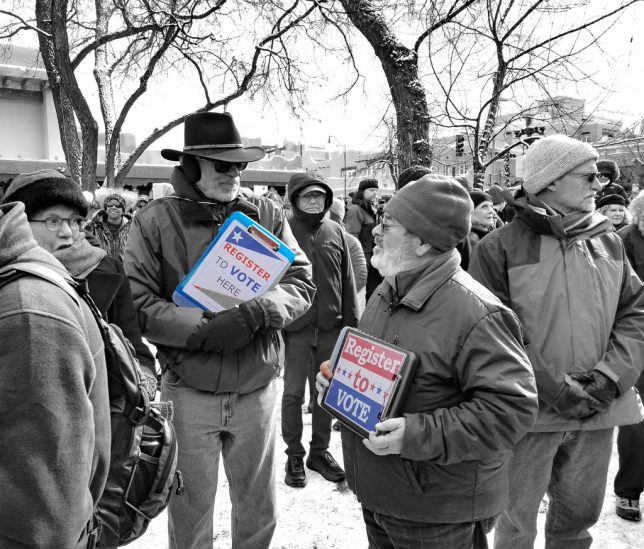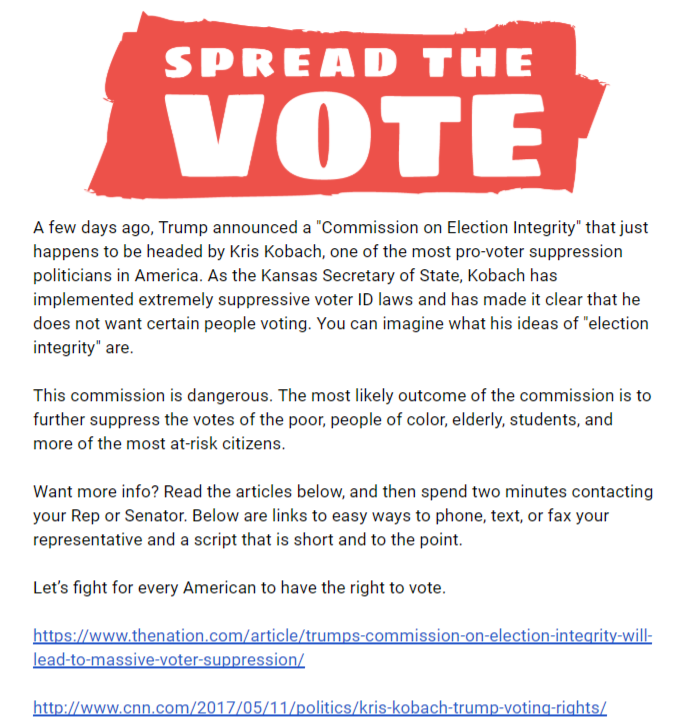Organization Trends
Is Spread the Vote Really Nonpartisan?


“Voter Fraud is a MYTH. Voter Suppression is REAL.”
So proclaims the website of Spread the Vote (STV), a left-leaning nonprofit created in late 2016 with the goal of “help[ing] every single American, no matter their background or party affiliation, obtain the identification they need to participate in our democracy.”
Spread the Vote is essentially an anti-voter ID group; it claims the “true effect” of voter identification laws is to “disproportionately suppress voter turnout for the young, new voters, the elderly, and minorities.” But unlike traditional anti-voter ID groups such as the Advancement Project—which generally attempt to undo voter ID laws and even re-enfranchise convicted felons—STV primarily helps new voters obtain IDs in states that require identification to vote, such as Virginia. To that end, it publishes detailed information on voter ID laws and requirements across the country. And STV goes to great lengths to register voters:
If you can’t afford the paperwork, we’ll pay for it. If you don’t have a car or can’t afford gas right now, we’ll drive you to the DMV. If your state’s law is confusing, our experts will walk you through every phase of the process [emphasis added].
But Spread the Vote also appears to engage in limited grassroots lobbying. The group publishes a bevy of call scripts and letters to the editor, encouraging individuals to “contact your reps [sic] and urge them to fight voter suppression.” These templates target at least eight states with voter ID laws, and the group’s call scripts ask callers to “fight Trump’s dangerous election commission” and “say no to Texas [and North Carolina] voter ID,” referencing recent legislation in those states and a 2017 decision by the President to appoint Kansas Secretary of State Kris Kobach to head the Commission on Election Integrity. (In one of its scripts, STV calls Kobach “one of the most pro-voter suppression politicians in America” who “has made it clear that he does not want certain people voting.”)
Nevertheless, Spread the Vote claims its focus “is not on advocating for change in the laws.” To be fair, as a tax-deductible 501(c)(3) nonprofit, STV is allowed to engage in grassroots lobbying on specific legislation—within limits. But a look at STV’s close engagement with politically active groups on the Left wears the nonpartisan veneer a little thin.
The far-left agitation group Indivisible hosted a “Spread the Vote ID Training” in September 2017, with the goal of “[f]lipping Congressional seats” in Georgia—particularly the state’s 6th Congressional District, which Democrat Jon Ossoff narrowly lost in a June special election. Citing “voter roll purges” and “strict GA voting ID laws requiring government issued IDs to vote in person,” Indivisible activists enlisted the aid of STV “to train us, develop an implementation plan, and provide the funding to cover the costs of voter IDs.”
This isn’t STV’s only run-in with Indivisible. As of May, the STV website advertises its “new Voter ID 101 guide with Indivisible,” guiding users to the site of Indivisible 435, a project of Indivisible “created in partnership with Spread the Vote.” Like its parent, Indivisible 435 endorses left-wing candidates for public office—15 as of May, and all Democrats espousing positions including “environmental justice” and greater gun control measures.
Spread the Vote also advertises its involvement with the NFL Players Association (NFLPA)—a professional football players union recently revealed as funding far-left, anti-Trump groups like the Center for Community Change Action, which spent $3 million supporting Hillary Clinton’s 2016 presidential bid. STV apparently plans to register new voters among attendees to the NFLPA’s 2018 summer camps in six states and help them obtain valid identification for voting. Unsurprisingly, of the six states where STV plans to “be on hand”—Georgia, Texas, Virginia, Tennessee, Florida, and California—all but the latter two curiously coincide with STV’s templated letters to the editor and prewritten call scripts opposing voter ID legislation.
But Spread the Vote is also involved with overtly political organizations. Resurgent Left, a political action committee that spends “each dollar you donate [to] rebuilding the Democratic Party,” lists STV as a partner.
NoRA, a 501(c)(4) agitation group that plans to “plaster the nation with the faces of those who take NRA blood money,” also lists STV as a partner.
The anti-Trump and supposedly nonpartisan March for Science (which nevertheless asks attendees to “actively advocat[e] for science” by registering to vote with the left-leaning group Rock the Vote) counts STV as a partner.
The PAC Run for Something—created by ex-Obama and Hillary Clinton campaign staffers with an advisory board of Democratic Party operatives from the Democratic National Committee, Latino Victory Fund, and others—also lists STV as a partner. Run For Something describes its goal as “help[ing] recruit and support young diverse progressives to run for down-ballot races in order to build a bench for the future.”
Virginia Democracy Forward, a PAC “working to turn Virginia blue,” even admits to STV’s activist goals. The PAC says that it plans to “engage” with “existing activist groups that are focused on mobilizing African-American communities on voting: e.g., Spread the Vote” [emphasis added].
Being listed as a “partner” on the website of a politically active group isn’t necessarily evidence as concerns Spread the Vote’s tax-exempt status. Neither is the suspicious characterization by a Ragtag volunteer (STV’s left-leaning tech provider) of the founding of STV as happening “in 2016 after the November presidential election of Donald Trump.”
But it does reveal a pattern of STV’s activity and associations that could very easily be interpreted as election intervention—which the IRS maintains a blanket ban on for 501(c)(3) organizations. STV’s close association with—and sometimes active aiding of—so many overtly partisan groups certainly ought to throw its nonpartisanship into doubt.
After all, no one should get a tax break for electioneering.





